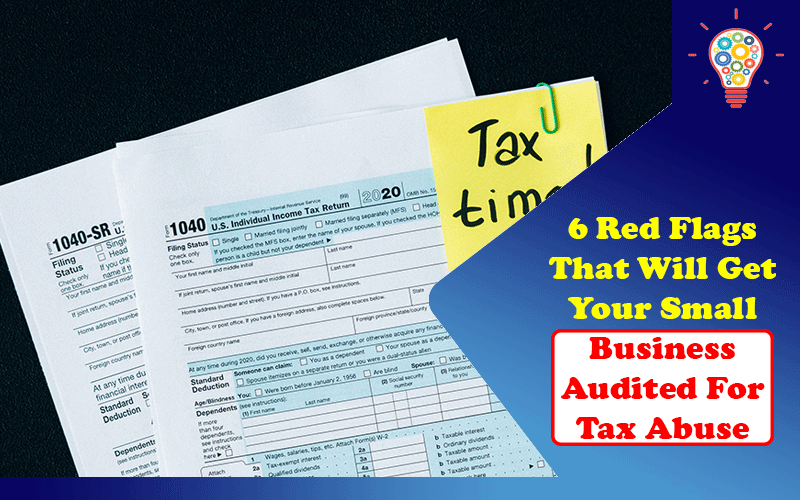In today’s competitive landscape, small business owners are profoundly involved in the company’s routine operations. They look after marketing campaigns, finances, hiring, and customer service. In all this chaos, they often forget about their tax obligations. As soon as tax season comes around the corner, it throws a wrench in their entire system. They have to drop everything to put consideration into tax reporting and filing.
Understanding the significance of accuracy when it comes to tax preparation is crucial for small business owners. You have to be careful of calculations, tax deductibles, income exclusions, and cash payments to avoid audits. Because if the IRS comes knocking, the hassle of providing evidence for earnings and expenditure also falls on the small business owner.
Although there isn’t any sure-shot way to prevent an audit, there are tactics to reduce its likelihood. Here we are highlighting six red flags that will get your small business audited for tax abuse.
Table of Contents
1. Calculation errors
With ever-evolving income and corporate taxes, entrepreneurs often lose track of the prevailing tax rates. Failure to keep up with current rates can lead to inaccurate tax calculations. In addition to attracting IRS attention, such calculation mistakes can create discrepancies in taxable income reporting. Besides this, some calculation errors also happen because companies use rounded numbers. It might be more convenient, but IRS gets involved if they notice a business isn’t using exact numbers to denote finances.
Therefore, brush up on your number-crunching skills to avoid calculation mistakes. You can take a few short courses or opt for higher degree programs. Luckily, you don’t have to go back to school for higher education. You can complete a bachelor of accounting online from the comfort of your office or home. It will equip you with savvy accounting skills, keeping you away from this red flag.
2. Net losses year-over-year
Is your business running into losses? Sometimes, entrepreneurs overstate income to report losses and avoid tax obligations. It might work once, but registering a net loss consecutively for 3-4 years will make the IRS take a closer look at your books. It believes companies are offending the rules and accounting standards by reporting multiple net losses. As a result, the IRS will conduct an audit to ensure your business has an actual and honest profit motive. To reduce the likelihood of such pitfalls, revisit your income and deductions to ensure you aren’t overreporting expenses.
3. Foreign earned income exclusions
Many small businesses selling online have revenues coming from abroad. You might be eligible for foreign earned income exclusion, but still, reporting it is crucial. You have to record the income in your financial statements and later apply for a tax exemption. Failure to report the income will put you under the IRS’s radar, increasing the chances of an audit. You can get in touch with an interactive tax assistant to help determine whether income earned from a foreign country is eligible for tax exclusions.
4. A lot of deductions
Even though most expenses are 100% deductible, you have to choose tax deductions carefully. If you are including travel expenses, meals, and fuel under expenses, ensure they qualify for business purposes. Any personal expense included under tax deductible can put your entire company in jeopardy. Thus, always make wise decisions while choosing deductions. If you face trouble categorizing business and personal finances, strengthen your business acumen.
You can look for online educational programs to learn the ropes while running your business. Perhaps, you can enroll in online MBA programs with a specialization in entrepreneurship to develop a better understanding of business. In addition to helping you identify deductions, you will learn to compare deductions over the years to ensure consistency.
5. Persistent late tax filing
You might be busy with installing a new plant or other business operations, but that’s no excuse for missing your tax obligations. Alongside a penalty fee, late filing can trigger unnecessary attention from the IRS. It will put you on the radar and makes tax authorities curious about why you are delaying taxes. Hence, always file your taxes promptly. You can start the process in January to ensure you aren’t missing out on any detail. However, if it seems impossible to meet the given deadline, ask for an extension beforehand.
6. Excessive use of business vehicle
The IRS is pretty quick to scrutinize whenever someone claims 100% business use of the vehicle. It publishes a standard mileage rate for business each year to ensure people aren’t overreporting the expense. Therefore, if you have a business vehicle, carefully document all the costs. In addition, mention the purpose of using the vehicle to ensure that it was used for business chores.
Another red flag could arise if you deduct vehicle expenses in multiple ways. According to the IRS, you can determine costs through standard mileage or actual expense techniques such as fuel and repairs. Choose a suitable deduction method; otherwise, the IRS may come calling about business deductions.
Conclusion
Small business tax preparation is already challenging, and the stress of auditing adds to the burden. It is a lengthy procedure that halts business operations and puts the company’s reputation at stake. To avoid this hassle, follow IRS guidelines and watch out for red flags that can get your business into trouble. You have to ensure timely tax filing, accurate calculations, and be careful about deductibles. It will help you through filing your tax return each year while closing doors for audit.

